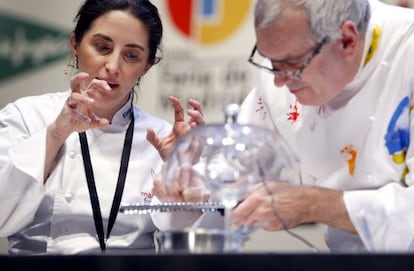Foreigners help Michelin-starred restaurants weather the storm
Spain's haute cuisine chefs say the top end of the market is doing well The effect of the economic crisis has been minimized thanks to overseas customers

When Ferran Adrià last year decided to close El Bulli and reopen the restaurant as a foundation, it was the first time that an eatery with three Michelin stars had ever shut down in Spain. But it should be noted that although the ground-breaking restaurant had never made money, Adrià's decision was not based on economic criteria.
Revenue had increased substantially over the course of its last year of life, thanks to Adrià's decision to rent El Bulli out to businesses. However, the super chef was not interested solely in making the books balance - he had decided to move on to new projects.
The point is that despite the depression that has crippled the Spanish economy over the last four years, the country's five three-star restaurants: Arzak, Martín Berasategui, Akelarre, Sant Pau and El Celler de Can Roca have continued to attract high-spending foodies prepared, in the case of El Celler, to wait up to one year for a table.
"The paradox is that right in the middle of a depression we are living through the best moment of our history," says Joan Roca, one of the three-brother team that runs Can Roca.
The paradox is that in a depression we're at our best moment in our history"
That said, Can Roca and other top-end restaurants in Spain owe their continued existence to foreigners: barely 20 percent of their clientele is Spanish.
At the same time, Michelin-starred restaurants have branched out: the Roca brothers also run Mas Marroch, a venue for private parties in the small town of Vilablareix in Girona; as well as Moo, a restaurant in the Hotel Omm in Barcelona; the Cap Roig annual festival restaurant, and the Rocambolesc ice cream parlor, which opened in Girona in April.
So far, despite repeated offers, the Roca brothers have decided not to open a Can Roca abroad. "We would need to think long and hard about that," says Joan Roca.
Juan Mari Arzak runs Arzak in San Sebastián with his daughter Elena, who was recently named the best female chef in the world, something her father likes to remind people about: "It's sensational, isn't it?"
Barely 20 percent of the customers of top-end restaurants in Spain are Spanish
He says the economic downturn has not affected business unduly. "We haven't had many problems. Our clientele is global. We have 60 places, and all of them are occupied. We have clients that come from as far afield as Australia, New Zealand and Japan to eat here," says Arzak, who insists that part of the secret of his success is having just one restaurant: "and it's the only one I want."
Which doesn't mean that he hasn't offered his services as an advisor. In April he signed a deal with the Sandó restaurant, located in the Mercure Hotel in Madrid. This falls under the remit of Arzak Instructions, set up by Arzak with his daughter and three of his top chefs.
"I do it for the money, not so much for me, but to help those who have worked with me for so many years," he explains. "The problem is that it takes up a lot of time, and can distract from the day-to-day running of the restaurant."
Julia Prats, a lecturer at the IESE business school, warns of the distractions of trying to expand. "What is worrying about diversification is that it requires a lot of business knowhow, otherwise it can end in disaster. The main mistake is to believe that on the basis of a brand it is possible to do anything, and it's just not like that."
Two-starred chef Sergi Arola has been successful in branching out, lending his name to restaurants in Brazil, Portugal, Chile and Barcelona, as well as his Madrid establishment.
Pedro Subijana, who runs Akelarre in San Sebastián, says chefs are playing a high-risk game by putting their name over the door of restaurants where they do not personally supervise the cooking. "Business want the prestige associated with your name, but are not necessarily prepared to put the same resources as you would into the project," he says. "That's why I put down a lot of conditions before I agree to advising a restaurant."
At the opposite end of the scale is Martín Berasategui, who has signed around half a dozen deals with hotel chains to use his name, among them the Condes de Barcelona, where he manages the Loidi and Lasarte restaurants, the luxury Abama, in Tenerife, as well as the Doma in Bilbao, run by the Silken chain.
He has also opened the Fuego Gastro Bar and Passion, both in hotels run by the Meliá hotel chain in the Dominican Republic. "The crisis is making itself felt, but now is a better time than ever to be advising other restaurants," he says.
As with other sectors of the economy, it is middle-ranking businesses that have been hit hardest. Between 2009 and 2011, more than 7,000 restaurants, bars and nightclubs have closed, according to consultants Nielsen. The number of such establishments has fallen to the same levels as in 1997: around 220,000 nationwide.
For Carme Ruscalleda, the owner of Sant Pau, in the coastal resort of Sant Pol de Mar, near Barcelona, expansion has allowed her to stay alive - just. The tsunami that hit Japan last year meant that her two-starred restaurant was demoted to one-star.
"Without my other operations, Sant Pau would barely break even," she says. "The reason for setting up a haute cuisine restaurant is not solely to make money, otherwise none of us would be doing this."
Running a three-star restaurant is an expensive business, says Andoni Luis Aduriz, seen by many as the heir to Adrià, who runs Mugaritz in San Sebastián. "In my business there is no plan B, only a plan A. I can't reduce my staff levels, nor find other suppliers; it has taken me years to build a relationship with them. The restaurant can only function on the lines along which it was originally set up," he says, adding he receives requests to open franchises in other countries every week.
Meanwhile, he says his other ventures, which are aimed more at the middle classes, are struggling. "We have seen a 30 percent drop in turnover in our other restaurants," he says.
Tu suscripción se está usando en otro dispositivo
¿Quieres añadir otro usuario a tu suscripción?
Si continúas leyendo en este dispositivo, no se podrá leer en el otro.
FlechaTu suscripción se está usando en otro dispositivo y solo puedes acceder a EL PAÍS desde un dispositivo a la vez.
Si quieres compartir tu cuenta, cambia tu suscripción a la modalidad Premium, así podrás añadir otro usuario. Cada uno accederá con su propia cuenta de email, lo que os permitirá personalizar vuestra experiencia en EL PAÍS.
En el caso de no saber quién está usando tu cuenta, te recomendamos cambiar tu contraseña aquí.
Si decides continuar compartiendo tu cuenta, este mensaje se mostrará en tu dispositivo y en el de la otra persona que está usando tu cuenta de forma indefinida, afectando a tu experiencia de lectura. Puedes consultar aquí los términos y condiciones de la suscripción digital.









































